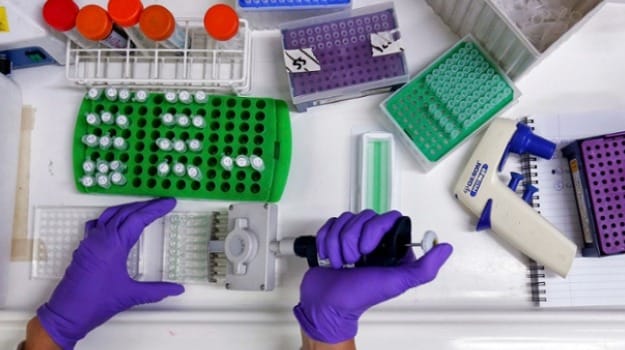Custom-made vaccines, designed to a make patient’s immune system attack tumours, have been used in a small-scale patient trial with some success
Personalised cancer vaccines that target people's individual tumours have shown early signs of promise in tests on three patients diagnosed with advanced skin cancer. The vaccines were designed to make the patients' immune systems unleash attacks on specific DNA mutations in their tumours, and so turn the body's natural defences against the disease.
The approach, tested for the first time in people at Washington University School of Medicine in St Louis, found that the vaccines caused the patients to launch powerful immune reactions against the tumours. Though promising so far, the research is at a very early stage, and the researchers cannot yet say whether the patients' health improved after the treatment. All three are stable and suffered no side effects, but further trials are needed to see whether the treatment can help to shrink or even eradicate tumours.
"These custom-designed vaccines can elicit a very strong immune response," said Gerald Linette, a cancer specialist leading the trial. Blood tests on patients who had the treatment revealed that their immune systems had produced waves of killer T-cells that can destroy tumours. "Our results are preliminary, but we think the vaccines have therapeutic potential based on the breadth and remarkable diverstiy of the T-cell response," Linette added.
The vaccines were created by first comparing the genomes of the patients' tumours with their healthy tissue to identify mutated proteins called neoantigens that were unique to their tumour cells. The scientists then used computer models and lab tests to work out which neoantigens were most likely to provoke the most powerful immune response.
The researchers used the list of neoantigens to make bespoke vaccines for each patient. They selected seven neoantigens for each, and embedded them into specialised immune cells called dendritic cells. When infused into patients, these dendritic cells act like biological wanted posters, telling the immune system what to look for and attack.
Over the next month, regular blood tests from the patients showed that all of them mounted hefty immune responses against the mutations that defined their tumour cells. "Many researchers have hypothesized that it would be possible to use neoantigens to broadly activate the human immune system, but we didn't know that for sure until now," said Linette. "We still have much work to do, but this is an important first step and opens the door to personalised immune-based cancer treatments."
At a press briefing, Linette said that all three patients had "stable disease" but stressed that it was too early to know if the vaccines had slowed or halted their deterioration. One patient's tumours shrank temporarily, but later grew back to their original size. Before the treatment, all three had had surgery to remove their tumours, but cancer cells had spread to their lymph nodes, an indication that the skin cancer was likely to recur.
"We can't say this treatment had any beneficial effect for the patients, it's too early," said Linette. But he added that using the therapy sooner rather than later could make it more effective.
The process of making each vaccine took three to four months, but that could come down to six weeks or a month, said Elaine Mardis, a co-author on the study published in Science. The researchers now plan a larger trial in more patients within the year.
The vaccines could be used to target other cancers with high mutation rates, such as lung, bladder and certain colorectal cancers.
"This exciting but very early stage trial shows that it may be possible to create vaccines that are tailored to the specific genetic mistakes in a patient's cancer," said Alan Worsley at Cancer Research UK. "At the moment it's not clear how effective this immunotherapy would be at killing cancer cells in the body and improving survival, but this promising study sets the stage for creating vaccines that are designed to target each patient's individual tumour in the future."
Currently the process of making each vaccine takes three to four months, but it is hoped that this could eventually come down to six weeks or a month. Photograph: Stefan Wermuth/Reuters










